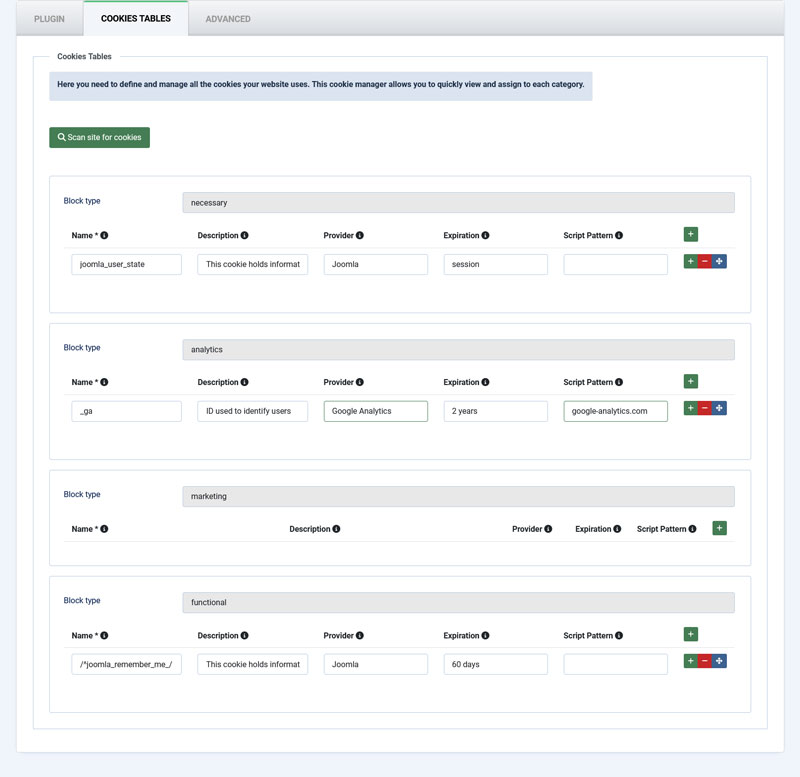Cookies Table/List
In the cookies list you can specify list of cookies in the category.

For every Cookie you can specify multiple parameters, depending on your site and Cookie Consent configuration:
Name
This option specifies name of the cookie (not the name displayed to user, but the technical name of the cookie, such as ba_cookie etc.). It could be simple name, or regular expression. When Regular expression is used, the name of the cookie is checked against this with Regular Expression. Enter Regular Expressions with any modifiers and initial and final slash (/). For example /^ga_/ for all cookies atrting with ga_.
Description
This is the text, presented to user. It should contain short description of the cookie and its purpose. Remember, that users will enable / disable Cookies on your site based on this description, so keep it short and descriptive.
Provider
Provider of the Cookie, which service use this Cookie. This column could be disabled in Settings dialog appearance settings. This should be something like Google, Youtube, or name of your site.
Expiration
Expiration of the Cookie, how long will this cookie remains on user computer.
How to manage scripts
This plugin has an in-built feature called automatic script blocking, which prevents all third-party cookies from being set until a user provides their consent. Cookies are only allowed to be set after the user gives consent or opts in for specific cookie categories.
This feature is crucial in compliance because regulations such as the GDPR mandate that websites must obtain explicit consent before placing any cookies on a user’s device unless the cookies fall under the category of strictly necessary or essential. The plugin help websites to auto-block any third-party script that sets cookies. For those cookies that are not automatically blocked by plugin, there are two ways in which you can block the scripts that install cookies on your website.
- Rendering scripts via plugin's settings
- Adding blocking code to the script
1) Rendering scripts via plugin's settings
You can effectively block scripts before obtaining user consent using settings. In this method, you need to specify the script pattern to block cookies set by third-party scripts. This plugin will recognize any script that matches that pattern and prevent it from setting cookies on your website users’ browsers until they provide their consent, ensuring that user data isn’t collected through cookies without proper consent.
To block a specific cookie under a particular category, navigate to that category and enter the Script Pattern of the third party to block cookies from them.
If a third-party script with the code <script async src='https://www.google-analytics.com/analytics.js'></script> sets a cookie, you can specify its “Script Pattern” as google-analytics.com.
2) Adding blocking code to the script
You need to change type attribute of your scripts to text/plain and add data-category category containing proper category on which the script should be executed, when user provides his consent.
So, for example, script loading some analytics JS file
<script src="analytics.js" defer></script>
will become
<script type="text/plain" data-category="analytics" src="analytics.js" defer></script>.
Same could be used for inline scripts, so for example
<script type="text/plain" data-category="ads">
console.log('"ads" category accepted');
</script>
If you need any help with the plugin, reach out to our support team at support@bestaddon.com